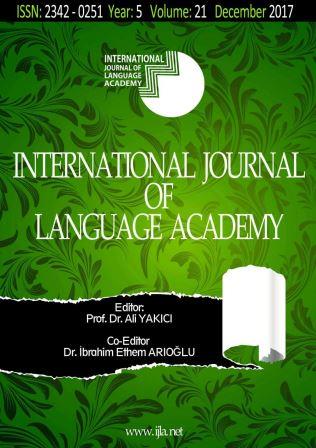SEKİZİNCİ SINIF ÖĞRENCİLERİNİN TARTIŞMACI METİN YAZMA BECERİLERİNİN ÇEŞİTLİ DEĞİŞKENLER AÇISINDAN İNCELENMESİ
Author :
Abstract
Bu araştırmada, tartışmacı metin yazma beceri düzeyleri ile tartışmacı metin yazma başarılarının kimi değişkenlere göre farklılaşma durumu sorgulanmaktadır. Bundan dolayı araştırmanın amacı, sekizinci sınıf öğrencilerinin tartışmacı metin yazma beceri düzeylerinin belirlenmesi ve birtakım değişkenlere göre farklılaşma durumunun incelenmesidir. Tarama modeline göre desenlenen araştırmanın evrenini, 2013-2014 Eğitim Öğretim Yılı’nda Rize ili Merkez ilçede 13 ortaokulun 8. sınıflarına kayıtlı öğrenciler oluşturmaktadır. Bu evrenden tabakalı örnekleme yöntemi kullanılarak 322 öğrenci örneklem olarak belirlenmiştir. Araştırmada öğrencilerden Tartışmacı Metin Yazma Formu’ndaki konulardan birini seçerek bir metin yazmaları istenmiştir. Öğrenci metinleri “Tartışmacı Metin Yazma Analitik Dereceli Puanlama Anahtarı” ve “Tartışmacı Metin Yazma Tutarlılık Dereceli Puanlama Anahtarı” kullanılarak puanlanmıştır. Bu yolla elde edilen tartışmacı metin yazma başarı puanları ile katılımcıların demografik özellikleri arasında anlamlı bir farklılık olup olmadığı sorgulanmıştır. Verilerin analizinde SPSS 23.0 paket programından yararlanılarak betimsel istatistik, t-testi, ANOVA ve tek yönlü varyans analizi kullanılmıştır. Araştırma bulgularına göre öğrencilerin tartışmacı metin yazma başarısının “orta” düzeyde, metin tutarlılığının ise “tutarsız” düzeyde olduğu anlaşılmıştır. Öğrencilerin tartışmacı metin yazma başarı puanları ile tartışmacı metinlerinde tutarlılık puanları arasında anlamlı bir ilişkinin olduğu ortaya çıkmıştır. Bu durum, metin yazma başarısında tutarlılığın işlevini ortaya koymaktadır. Öğrencilerin tartışmacı metin yazmada iddia” ve “sonuç” birimlerini oluşturmada başarılı; “veri” birimini oluşturmada ise başarısız oldukları belirlenmiştir. Araştırmada, katılımcıların tartışmacı metin yazma başarılarında cinsiyet, anne ve baba öğenim durumu, ailenin aylık geliri ve evlerinde kitaplık olma durumlarına göre anlamlı farklılık olduğuna yönelik bulgular elde edilmiştir. Bu bulgular, sözü edilen değişkenlerin tartışmacı metin yazma başarısında belirleyici olduğunu göstermiştir.
Keywords
Abstract
In this research, the argumentative text writing skill levels and the differentiation of the argumentative text writing achievements in accordance with certain variables have been questioned. Therefore, the purpose of this study is to determine the argumentative writing skill levels of eighth-grade students and to investigate the differentiation in accordance with certain variables. The universe of the research, which was designed according to the screening model, was formed by the 8th-grade students of 13 different secondary schools in the central district of the Rize province in 2013-2014 Education Year 322 students from this universe were defined as the sample using the stratified sampling method. In the study, students were asked to write an text by selecting one of the topics in the Argumentative Text Writing Form. The texts that the students wrote were scored using “Analytically Graded Scorecard for Argumentative Text Writing” and “Coherence Graded Scorecard for Argumentative Text Writing”. Whether there was a significant difference between the argumentative text writing achievement scores obtained using this way and the demographic characteristics of the participants was questioned. In the analysis of the data, descriptive statistics, t-test, ANOVA, and one-way variance analysis were utilized by making use of SPSS 23.0 program pack. According to the findings of the research, it was understood that the students' achievement levels in writing argumentative texts were at “medium” level and the coherence levels of the texts were identified as “inconsistent”. It was found that there was a significant relationship between students' achievement scores in the argumentative text writing and the coherence scores in these argumentative texts. This demonstrates the function of coherence in writing text. It was determined that the students were successful in constructing the “argument” and “result” sections in writing argumentative texts and unsuccessful in constructing the “data” sections. In the study, the participants had significant differences in the achievement levels of writing argumentative texts according to genders, their mothers 'and fathers' educational statuses, their families' monthly incomes, and having libraries in their homes. These findings indicate that the mentioned variables have decisive characteristics for their achievements in argumentative text writing.





